Clifford Garstang's Blog, page 60
August 20, 2014
On Vacation . . . from Facebook
 I actually enjoy Facebook. It’s fun to interact with people I cant’s see face-to-face often, to see what they’re up to and to share news and events with them.
I actually enjoy Facebook. It’s fun to interact with people I cant’s see face-to-face often, to see what they’re up to and to share news and events with them.
It also drives me crazy. People (I’m guilty of this) post things that aren’t true–thanks to a proliferation of fake news sites and also thanks to political spin from the right (mostly) but also from the left. When I see such false stories, I feel compelled to react, and that gets me embroiled often in conversations I don’t really want to have. And before long, I’ve wasted a whole day doing nothing but Facebook.
But I’ve got work to do! I’m trying to finish the first draft of a book and my goal is October 1. If I’m going to meet that goal, I need more discipline. And that starts with staying away from Facebook. So, as of today, I’m on vacation. I’m not at a beach, which is too bad. I’m at home. Working. But I’m going to do my best to stay away from social media until September 1. If you need me, shoot me an email.
(I’m aware that my settings are such that this blog post will appear on Facebook.)
August 18, 2014
Debra Spark on “Raiding the Larder” (from the Writer’s Chronicle)
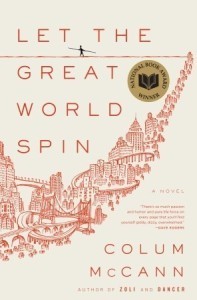 When I make the time to read it, I really enjoy The Writer’s Chronicle. In addition to the classified writing opportunities, there are usually a few craft articles or interviews that are useful and interesting. One such article that I enjoyed in the current issue (September 2014) is Debra Spark’s “Raiding the Larder: Research in Fact-Based Fiction.” Admittedly, the point of the article—that effective research can elevate a novel and transport the reader so long as it doesn’t get in the way of the story—is familiar. It’s a common enough conundrum—how much research is too much?
When I make the time to read it, I really enjoy The Writer’s Chronicle. In addition to the classified writing opportunities, there are usually a few craft articles or interviews that are useful and interesting. One such article that I enjoyed in the current issue (September 2014) is Debra Spark’s “Raiding the Larder: Research in Fact-Based Fiction.” Admittedly, the point of the article—that effective research can elevate a novel and transport the reader so long as it doesn’t get in the way of the story—is familiar. It’s a common enough conundrum—how much research is too much?
What really grabbed me about the article, though, was this: “Next to ‘How are you?’ the question that I most regularly ask people is ‘What have you read lately that you love?’ For years now, when people have asked me to respond in kind, I’ve said, ‘Colum McCann’s Let the Great World Spin.” She goes on to say, “I love the novel as a work of fiction: for its artful construction, big vision, emotional accuracy, compelling characters, and complicated conceit, but it also impresses me as a research accomplishment.”
Exactly. I’ve been saying more or less the same thing since I read the book in 2010. I was so blown away by the book—despite some misgivings about narrative threads that for most of the novel seemed to have nothing to do with each other—that I considered giving up my own writing. What was the point? But then I read a lesser novel, one with little ambition executed poorly, and I was freed from my paralysis. (“I can’t do any worse than this,” I remember thinking.)
Spark contrasts McCann’s work with the work of other fine writers who merely use the facts of life as ingredients for their work. She’s borrowing from Lorrie Moore here, whom she quotes: “For the writer, the facts of life are like ingredients in a kitchen cupboard. The cake you make is the fiction.” Nothing wrong with that, and Spark cites examples: Alice Munro, Richard Russo, Elizabeth Strout, William Trevor, and Tobias Wolff. Other writers, like McCann, though, “go looking for something different, find it, explore it, then come back to report.”
Spark observes that many of her favorite books and indeed many notable books generally appear to be deeply researched. She notes that part of what appeals to her about these books is that they taught her something. Research can be a trip—literally and figuratively—that will lead to places the writer never meant to go, but that’s part of the joy of doing the work. As long, that is, as we keep reminding ourselves that not all of that great research needs to wind up in the book, at least not on the page.
August 15, 2014
2014 Reading: Dust to Dust by Benjamin Busch
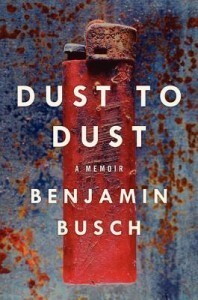 Dust to Dust: A Memoir by Benjamin Busch
Dust to Dust: A Memoir by Benjamin Busch
You may know Benjamin Busch as an actor on The Wire and other television programs and movies. I’ve never seen The Wire—no TV, no cable, no satellite—so I haven’t seen his acting work. I know him because we’re Facebook friends, although I’m not sure how that came about. And I’ve known of him for a long time, since I read his father’s essay in Harper’s about Ben’s military service. You see, I was a fan of the fiction of Frederick Busch, Ben’s father. The elder Busch, who died suddenly in 2006, was a terrific novelist and story writer. (I have a shockingly large collection of his books, more than one signed by him; I even had the pleasure of hearing him read once in DC at Chapters and I remember him talking about his dogs, which made me like him even more . . .)
Anyway, because of our connection on Facebook, I decided I needed to read Ben’s memoir, Dust to Dust, which is partly about his service in Iraq, but also is about growing up and a good bit about mortality. It’s a terrific, lyrical book, and if you haven’t read it I recommend it. It is structured thematically, each chapter dealing with an “element”—water, soil, wood, stone, ash, etc.—and approaches each theme with anecdotes from childhood, his military service, or his more recent life in rural Michigan. It’s unique, I think, because it’s far from chronological, and yet we still get a sense of time passing from his early interest in the military when he was a boy to his final deployment to Iraq.
As I was reading it, I was drawing a contrast with Townie, the Andre Dubus III memoir I read recently. Dubus is also the son of a hightly regarded writer, and was also a fighter (in a very different way), but his memoir proceeds from his earliest days to the present. It also ends shortly after the death of his father, as Dust to Dust does. The books make an interesting pair.
The book also brought to mind a couple of other recent reads. The Yellow Birds by Kevin Powers (whom I met at the Library of Virginia Awards last year) is a novel about a young soldier’s service in Iraq and its aftermath. The Good Soldiers by David Finkel is nonfiction about a whole unit deployed to Iraq. Both books do a good job of showing the horror of war and the particular challenges of Iraq. Busch treats some of the same material—he’s as familiar with the grimness as Powers, but he has some of the detachment that Finkel, a journalist, shows. These three books would make a good core for someone interested in the literature of the Iraq war.
I’ve been thinking of tackling a memoir project, and I’d be very happy if I could come close to the humanity that Busch displays here.

Tim Weed launches Will Poole’s Island
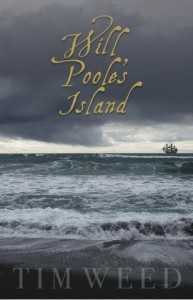 Will Poole’s Island by Tim Weed
Will Poole’s Island by Tim Weed
It’s a big week for book launches in my world. Tuesday saw the release of Richard Bausch’s new novel as well as Martha Woodroof’s debut, and today is the official publication day for my friend Tim Weed‘s book, Will Poole’s Island. (Tim is also a contributor to Everywhere Stories: Short Fiction from a Small Planet, the anthology I edited.)
Set in the Connecticut Colony in 1643, the book is the story of young Will Poole, a young man who lives in a walled English village at the edge of the North American wilderness. Although the book, published by Namelos, is technically a young adult novel, don’t let that stop you. I’m really looking forward to reading it.
Also, check out the cool trailer: Will Poole’s Island

August 14, 2014
Martha Woodroof: Small Blessings
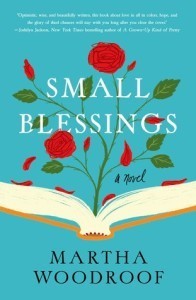 Small Blessings: A Novel by Martha Woodroof
Small Blessings: A Novel by Martha Woodroof
Martha Woodroof is a local radio personality, a familiar name and voice to listeners of WMRA, the local NPR affiliate in our area. I know her because she interviewed me for her show, “The Spark,” and because we’ve met a few times for lunch to talk about writing and creativity. (You can listen to her interview me here.)
Now, Martha is also a novelist. Her first novel, Small Blessings, has been published by St. Martin’s Press, and I had the pleasure of attending her book launch at Stone Soup Books in Waynesboro, a great place for a book party (although small) because of the cafe that serves good food and drink. I haven’t yet read the book, which based on what Martha read from it at the party centers on Rose Callahan, a woman who arrives on a small college campus (based on Sweetbriar, Martha admits) to run the bookshop’s cafe. Just from the first few pages, we get an air of intrigue–who is this mysterious woman, and which male faculty members are going to make fools of themselves pursuing her?
I have a feeling–if only because of who was present at the book launch (I was the only man)–that the book’s appeal will mostly be to women. But I look forward to reading it. Martha is a fun person and I expect the prose to be the same. I wish her the best with her first novel!
August 11, 2014
2014 Reading: The Amazing Adventures of Kavalier & Clay by Michael Chabon
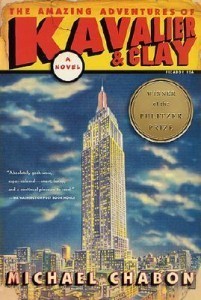 The Amazing Adventures of Kavalier & Clay by Michael Chabon
The Amazing Adventures of Kavalier & Clay by Michael Chabon
I listened to the unabridged audio version of The Amazing Adventures of Kavalier and Clay—mostly in the car but sometimes at the gym. I haven’t been going to the gym much lately, so it took a really long time to get through the book, which is 500 pages but feels longer. I liked it very much. I knew before I started it that it was about comic book creators, but I didn’t realize what its underlying themes were. The largest of those themes is escape—Joseph Kavalier’s escape from the Nazis, his escape from the gloom of the war and his family’s death, his escape from Antarctica, and Sammy’s escape from the lie he lives. And of course there is the comic book character they create: The Escapist, a figure inspired by Joe’s training as a magician and escape artist in his native Prague.
The theme underlies the story, which is a bit rambling but never veers off course. Joe arrives from Prague in 1939 and lives with Sammy and his mother in New York. Sammy, whose father had been in vaudeville, works in a novelty company but aspires to draw comic books. Joe is an artist who needs work, so their collaboration is instant and almost immediately the invent The Escapist and their comics are a hit. Joe meets Rosa and life seems good, but then the war rears its head. Joe joins the Navy and disappears and in his absence life gets very complicated for Sammy and Rosa.
Although a lot happens to Sammy and Joe, and they each have their adventures, together and separately, there isn’t really a single plot. What makes the book work is the change we see in Joe and Sammy, a steady change over the course of twelve years.
The book was a deserving winner of the Pulitzer Prize. It’s very impressive.

On hearing Richard Bausch read from his new novel
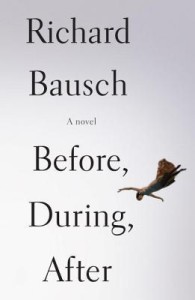 Tomorrow, August 12, is publication day for Before, During, After, the new novel by Richard Bausch, his 20th book of fiction (or something like that–is there a point at which you stop counting?).
Tomorrow, August 12, is publication day for Before, During, After, the new novel by Richard Bausch, his 20th book of fiction (or something like that–is there a point at which you stop counting?).
On Saturday evening, I crashed the party, so to speak, at the inaugural Virginia Quarterly Review Writers’ Conference in order to hear Dick read. (Not really. The reading was one of several events during the conference that was open to the public.) It was good to see him and also to see the good folks at VQR. It looked like they had a decent turnout for their conference. Maybe next year I’ll attend the whole thing.
Bausch’s reading was preceded by very short readings by a few of the conference participants, but he was certainly the main event. He started by reading just two short excerpts from the book–both set on September 11, 2001: One from the point of view of Natasha, who worries about her husband in NYC when she hears the news, and one from the point of view of the husband as he is fleeing the city after the World Trade Center has fallen. Dark stuff, but then Bausch often is quite dark in his work, and that’s one reason I’ve always admired it. After the excerpts, he read a full short story, “The Knoll,” which I gather is part of a new story collection that is forthcoming. It’s a powerful story. (He pointed out that younger readers may not understand that the title is a reference to the Grassy Knoll or, for that matter, what the significance of that is.) Anyway, I’m looking forward to reading the book. I reviewed Bausch’s last novel, Peace, and you can read that review here: Book Review: Peace by Richard Bausch.
I first met Dick ten years ago. I had recently graduated from my MFA program and I was attending the Sewanee Writers’ Conference for the first time, hoping to figure out what to do with my draft novel, the hot mess that had been my thesis. It was long and “ambitious,” which is code, I’ve come to learn, for too complex for my abilities. I was wowed by Dick in the workshop, and he and Jill McCorkle made a great team–funny and smart and dedicated writers and teachers. I don’t remember much about comments I received in that workshop on my novel, but I do remember that Dick suggested I split the book into two and work on the part that most interested me. I saw the merit in that suggestion, and proceeded to spend several months extracting one of the threads of the book to create a separate novel. My plan was to use the remainder for a sequel, and I even envisioned a third book (because a trilogy sounded better and sturdier than a pair). Ambitious!
Although I completed the book, I guess it wasn’t very good, because I wasn’t able to get an agent for it and so no publisher. The trilogy idea languished. I concentrated for a few years on short stories, instead, and that led to the publication of both of my books. But now that I’ve been working on novels for several years, I have thought about returning to that failed novel attempt in order to resurrect it. My writing is much stronger now, and I think I have a better understanding of plot and character. So it is an interesting coincidence that just as Dick Bausch comes to town, 10 years after he changed the direction of that old novel, I’ve started thinking about it again and have sketched a rough outline of how it would develop.
What will come of it? I’m not sure. I’m in the middle of another book right now and have a second project that is also pretty far along. I’m torn, though. It would be great to give that book life. 
August 10, 2014
Frontier Culture Museum of Virginia
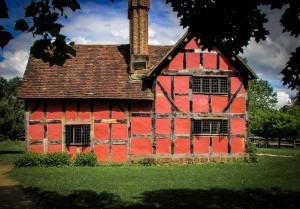 A couple of weeks ago I was contacted by Governor Terry McAuliffe’s office to see if I would be interested in serving on the Board of Trustees of the Frontier Culture Museum of Virginia. Earlier in the summer I’d considered putting my name forward for some kind of appointment, and the FCM was on my list. I just got busy and didn’t get around to it. So the call was welcome and I did not hesitate to accept the appointment, which became official yesterday with the Governor’s announcement.
A couple of weeks ago I was contacted by Governor Terry McAuliffe’s office to see if I would be interested in serving on the Board of Trustees of the Frontier Culture Museum of Virginia. Earlier in the summer I’d considered putting my name forward for some kind of appointment, and the FCM was on my list. I just got busy and didn’t get around to it. So the call was welcome and I did not hesitate to accept the appointment, which became official yesterday with the Governor’s announcement.
To be honest, prior to the appointment I hadn’t been to the museum in years, although I had taken groups of visitors there in the past. But the afternoon I got that call, I went over to the museum and gave myself a tour. I loved it! If you haven’t been, check out the website and then come to Staunton to visit in person. It is a living museum with exhibits from the Old World–including an Igbo village and farms from England, Ireland, and Germany–and the New World–including a native American settlement and American farms from the earliest days to the 1820s and 1850s. And expansion continues with the addition of a church and a small town.
I’m not sure what I’ll be able to contribute as a member of the Board of Trustees, but at least I can encourage others to take advantage of this relatively unknown gem.
August 9, 2014
Heifetz International Music Institute at Mary Baldwin College
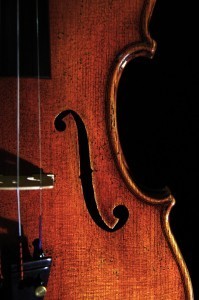 Staunton, Virginia is a small town — just 25,000 people — but it is surprisingly rich in culture. I’ve often written about the American Shakespeare Center and its productions at the beautiful Blackfriars Playhouse, something the town has become known for. But Staunton is also a music city, with some amazing festivals and performances in just about all styles. It’s hard to keep up with it all really. Today is the Blues & Brews Festival at the Frontier Culture Museum. The three-day Oak Grove Folk Music Festival is also happening now. The Staunton Music Festival runs August 15-24, and that is a very big deal–I plan to take in some of those concerts if I can. At other times of the year there are festivals promoting jazz, rock, country and whatever other variety of music you can think of. And then there’s the Staunton Music Guild, which supports local performers of all kinds.
Staunton, Virginia is a small town — just 25,000 people — but it is surprisingly rich in culture. I’ve often written about the American Shakespeare Center and its productions at the beautiful Blackfriars Playhouse, something the town has become known for. But Staunton is also a music city, with some amazing festivals and performances in just about all styles. It’s hard to keep up with it all really. Today is the Blues & Brews Festival at the Frontier Culture Museum. The three-day Oak Grove Folk Music Festival is also happening now. The Staunton Music Festival runs August 15-24, and that is a very big deal–I plan to take in some of those concerts if I can. At other times of the year there are festivals promoting jazz, rock, country and whatever other variety of music you can think of. And then there’s the Staunton Music Guild, which supports local performers of all kinds.
I’m writing now, however, about a festival that just concluded, the Heifetz International Music Institute at Mary Baldwin College. This is a gem. The institute, a 6-week teaching festival for talented young musicians from around the world, is a relative newcomer to Staunton, and I finally got around to going to a performance just this week as the festival was concluding. This year there were 79 students–cellists, viola players, and violinists–with a rotating faculty from some of the world’s top conservatories. What a great experience for the musicians and a treat for the residents of our area.
The concert I went to included three pieces–Bach’s Brandenburg Concerto No. 3, an Octet by Mendelssohn, and Tchaikovsky’s Souvenir of Florence. All three pieces were done by ensembles made up of students and faculty, except for the last movement of the Tchaikovsky which was performed by all 79 students–that’s a lot of violins, cellos, and violas. Also, at one point one of the violin faculty broke a string, bringing the performance to a halt. While we waited for him to repair the string, Daniel Heifetz got one of the students to play a short Bach piece. (She was quite embarrassed at first, but she closed her eyes and played beautifully.)
I’m so glad that I finally went to one of their concerts. Next year I’ll catch more–the festival includes free concerts by students and paid concerts by faculty. And I’m also excited now for the Staunton Music Festival, kicking off in just one week.
August 5, 2014
2014 Reading: The Car Thief by Theodore Weesner
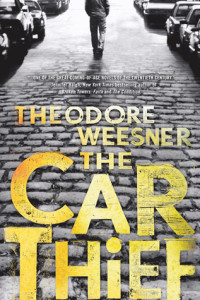 The Car Thief by Theodore Weesner
The Car Thief by Theodore Weesner
Astor & Blue Editions
The Car Thief, republished as an eBook in 2012 by Astor & Blue and now available in paperback also, was Theodore Weesner’s first novel, originally published by Random House in 1972. Weesner, a graduate of the Iowa Writers Workshop, went on to publish several more novels and a collection of short stories and is said to be, though nearing 80, working on a memoir and a new novel.
The book tells the story of young Alex Housman, in 1959, in Detroit, a sixteen-year-old car thief. He is driven to steal—but not to steal, exactly, Alex is a joy-rider—out of boredom. He lives with his alcoholic father, has memories of being abandoned by his mother and separated from his younger brother, is ashamed of the squalor in which he now lives. He’s a smart kid, but doesn’t apply himself in school. But, of course, getting caught is the best thing that could happen to him, and after a stay in a juvenile detention center he’s on his way to rehabilitation. He’s seen what the future can be, and he wants no part of it. It’s a fragile recovery, though, with pitfalls and setbacks. The great tension of the novel is the reader’s fear that Alex will make a mistake and backslide, and his journey unfolds against the drama of life in his dysfunctional family.
It’s a coming-of-age story, one that is based closely on Weesner’s own life. The biographical note on the author tells us that his home life was similar to Alex’s and, like Alex, he was charged with car theft as a teen. The coming-of-age genre refuses, unfortunately, to go away, and so it’s hard to imagine that readers today will care much about Alex and his 1959 problems. We’ve got more than enough contemporary coming-of-age stories as it is, and way bigger problems.
Still, it’s a compelling read. Alex is a troubled kid, and if we don’t exactly like him, it’s not hard to sympathize. If he doesn’t behave well toward girls—and he doesn’t—he hasn’t had very good role models. His father is a drunk and his mother disappeared years earlier, resurfacing only long enough to take her younger son away. And if he doesn’t make very good choices, it’s because he gets no guidance. Alex is left to fend for himself most of the time—cooking, laundry, house cleaning—and school doesn’t interest him at all.
Fortunately, though, after his arrest, he is aided by two men who understand where he’s coming from. Without them, Alex’s life would take one tragic turn after another. That, maybe, is the message here. You can’t expect a kid to grow up and get it right without someone showing the way. In this case, it’s Mr. Kelly, who runs the juvenile detention center, and Mr. Quinn, his probation officer and counselor. From them he gets discipline and advice. In them he sees men who have come from similar backgrounds who have risen above their youthful mistakes. He sees that he doesn’t have to end up like his father.
We can’t expect kids to figure everything out by themselves, the book appears to be saying. We have to show them the way.



